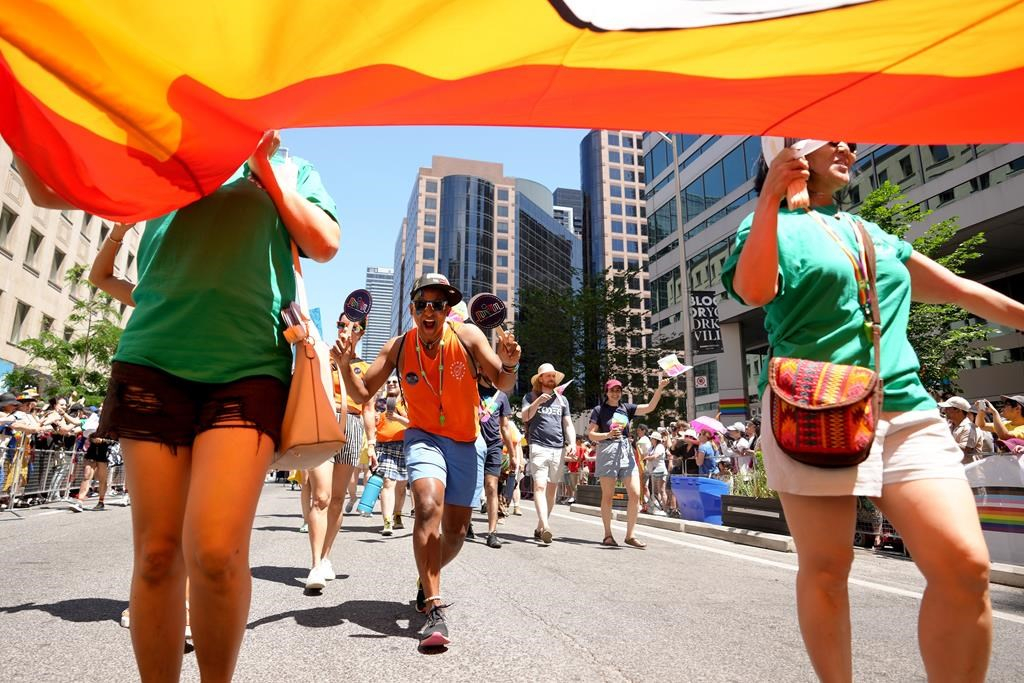Canada's largest Pride parade in Toronto included celebration and protest

Bubbles filled the sky and cheers rang through the streets of Toronto on Sunday as thousands of colourfully-clad revelers at Canada's largest Pride parade voiced their support for a community facing rising levels of hate and intolerance.
The massive crowds thronged the city's downtown core, many waving rainbow fans under sunny skies as they tried to beat the heat.
Several said they felt extra impetus to attend this year's parade as LGBTQ people, both at home and abroad, face increasing attacks on their hard-won rights.
"Pride is a celebration but it's also a protest," said Sarah Rice, who travelled from London, Ont., to take in the festivities.
"I think this year in particular, it's been important for the queer community to show up, be visible, and have our voices heard."
Rice described the current time as a scary one, citing efforts to roll back rights in some places.
In the U.S., at least 20 states have enacted laws that either limit or outlaw gender-affirming medical care for transgender minors as part of a larger suite of restrictions being imposed by Republican-led state legislatures.
Closer to home, figures from Statistics Canada show police-reported hate crimes based on sexual orientation increased almost 64 per cent in Canada between 2020 and 2021. Efforts to remove books with LGBTQ content and prevent the raising of Pride flags have also reached a boiling point at some schools and boards, while some Canadian venues have come under fire from protesters opposed to drag shows.
On Sunday, some marchers carried banners featuring slogans such as "protect trans youth" and "protect trans kids."
The increasingly contentious climate prompted Pride event planners in Toronto and beyond to significantly step up security measures. The federal government also pitched in with more than $1.3 million in emergency funding to help with security costs at Pride events.
Pride Toronto, organizer of Sunday's parade featuring at least 250 participating groups, said it spent twice as much money on policing for this year's event than it did in 2022.
But attendees said the environment that makes extra security necessary also makes it all the more important to celebrate Pride and show solidarity with the LGBTQ community.
Grace Siwinski and Ava Dobmeier drove up from Pennsylvania for the event.
Like Rice, they said they came both to celebrate and to protest.
"It's important to show up to Pride because you need to show that this is a huge community and we're a loving community. We're proud of who we are," said Siwinski.
"It's fun to party and to celebrate your culture and who you are."
Georgie Sountos continued to uphold a decades-long tradition of celebrating Pride by attending Sunday's march. The 65-year-old Torontonian said she has been coming to Pride since attendance numbered in the tens and hundreds, a far cry from the crush of people filling major arteries like Yonge Street and Church Street on Sunday afternoon.
"We're here, we're loud, we're proud, we count," Sountos said.
Sountos had a message for the younger generation of LGBTQ people: "Just be yourself. Be proud and show it."
She encouraged people feeling alone or feeling like they have no way out to talk to others and use any programs available to them.
The march also drew some prominent politicians, including federal Finance Minister Chrystia Freeland, federal NDP Leader Jagmeet Singh and a handful of candidates hoping to be elected as the city's mayor in a byelection set for Monday.
Prime Minister Justin Trudeau, who has attended Toronto's Pride parade in the past, missed this year's festivities due to a two-day summit of Nordic leaders in Iceland.
This report by The Canadian Press was first published June 25, 2023.




Comments